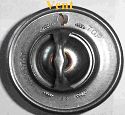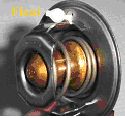
|
V8 Column for November 2005 This month we have an extract from one of the V8NOTES recently released in a batch of new notes. As this one is important it is included in this month's V8 Column. It is an example of the good quality of postings on the V8 Bulletin Board which are providing a rich source of material for the long running V8NOTES series. Next month we have a four page V8 Newsletter which will be packed with news of the successful V8 Essex Tour, 2004 an announcement of the V8 Lincolnshire Tour 2005 being arranged by Mike Taylor and more useful workshop notes.  Flamenco Red 2903, the last V8, has recently resurfaced after being sold off from the Heritage Collection at Gaydon. (Photo: Fred Jenns) Thermostat wrinkle explained Philip James (Sandglow2868) from Surrey posted a reply to a query on the V8BB which is a useful reference to avoid frustration later. (V8NOTE334 released Aug 05) Severe overheating difficulties can arise from a simple to cure oversight relating to the thermostat. The V8 engine is prone to air locks in its cooling system and one area where the air collects is in the thermostat housing, the highest point of the inlet manifold. The initial symptoms of this are very high temperature readings during warm up but once the thermostat has opened the temperature the coolant from heating the whole of the thermostat. Temperatures can rise to boiling point before the thermostat opens. Over time the |
thermostat can become
distorted and stick, causing erratic temperature variations at all
times and further overheating. mounting of the thermostat which can
allow air to be trapped and
the coolant from
heating the whole of the thermostat. Temperatures can rise to boiling
point before the thermostat opens. Over time the thermostat can
become distorted and stick, causing erratic temperature variations
at all times and further overheating. mounting of the thermostat
which can allow air to be trapped and settles back to normal. The
cause of this is the unusual vertical prevent. Damage can extend
to cylinder head gasket failure and water pump bearings. |

